Generations of alumni share what Wayne Moyer meant to them
July 18, 2024 — After 52 years of teaching at Grinnell political science professor Wayne Moyer is entering the realm of senior faculty status. To some that may sound like retirement, but Moyer has a busy five-year plan.
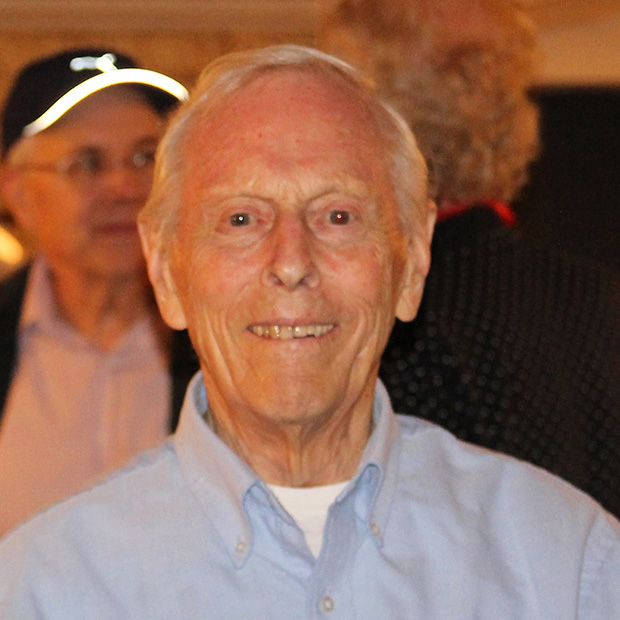 Wayne Moyer
Wayne Moyer
Next month he’ll visit rural villages in Kenya and Tanzania with World Neighbors, a charitable organization on whose board he serves. Following that he’ll be on leave for a year to research local, national, and global issues in climate change, agriculture, and farming; and starting in 2025-26, he’ll assume senior faculty status, likely teaching a tutorial and possibly a political science seminar.
“I’ll also supervise student MAPs and independent projects, and I hope to keep some advisees,” Moyer says. And he’ll continue as a regular politics contributor to the Iowa Public Radio show, River to River.
While finished with teaching full time, Moyer isn’t really giving a full-on retirement announcement. Yet the mere hint of the word elicited a flood of memories and tributes from decades of alumni.
“Professor Moyer was incredibly kind to and invested in his students – representing what makes the education at a place like Grinnell special,” says Michael Goldfien ’12.
Getting to know all his students
Moyer arrived at Grinnell in August 1972, and besides an occasional sabbatical has been at the College ever since. Whether it was the end of semester brunch and croquet at his Rock Creek home; invitations to lunches and dinners with world leaders visiting Grinnell; classroom debates, presentations, and discussions; or sage advice from Moyer about internships, graduate school, and other plans, Moyer’s passion for the College and his students has never wavered.
“His excitement for the subject matter was contagious and like many others, I took his classes over and over again,” recalls political science major John Shumway ’81. He recounts returning to campus with his wife for a Reunion and hearing a loud voice calling “Mr. Shumway” from a distance. “It was Wayne, of course. I’m sure he remembers everyone.”
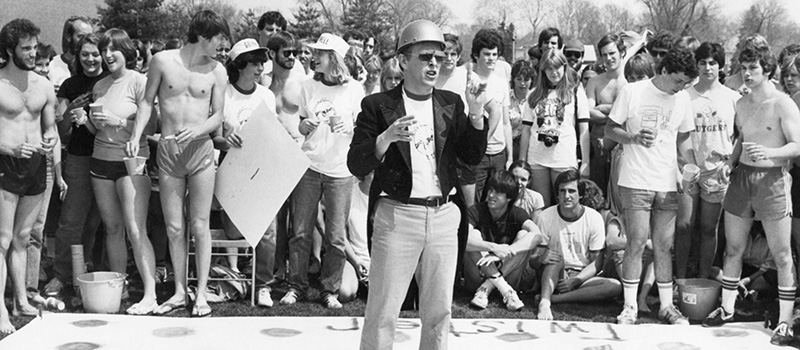 A 1983 photo shows Wayne Moyer giving instructions before students play a game of Twister at the Grinnell Relays.
A 1983 photo shows Wayne Moyer giving instructions before students play a game of Twister at the Grinnell Relays.
Whether it’s an advanced seminar or an introductory class, Moyer says, “I like to get to know every student in my class and have some understanding of how they’re thinking about issues. And I try to get them engaged in the issues we’re talking about.”
For many students, and especially political science majors, the closeness Moyer fostered has had lasting effects. On May 30 at Reunion 2024, the classes of 1978, 1979 and 1980 held a reception and dinner for Moyer at Prairie Canary. It was organized by Gregg Edwards ’80, who reached out to friends from his fall 1976 tutorial taught by Moyer, American Presidents and their Secretaries of State.
“We were a coherent group and throughout the years we organized dinners with Wayne, so there was a tradition of doing this,” says Edwards, who for years served in GOP leadership positions in New Jersey. “We grew really close because of the way Wayne conducted the tutorial.”
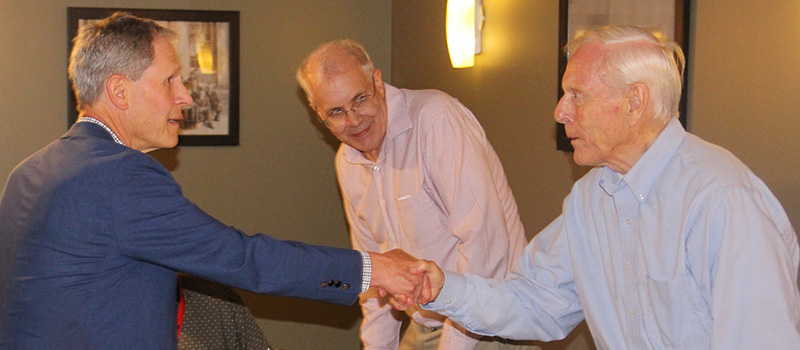 Peter Levy '80 shakes Moyer’s hand at a dinner for the professor held by the classes of 1978-1980 during Reunion 2024.
Peter Levy '80 shakes Moyer’s hand at a dinner for the professor held by the classes of 1978-1980 during Reunion 2024.
Edwards and other students also spent Thanksgivings with Wayne and Helen Moyer, too.
“He had very high expectations for all of us,” Edwards said. “You never wanted to disappoint him – he invested so much time and effort in you, and we always felt an obligation to give the best back to him. Wayne took his counseling seriously.”
Words of wisdom
Political science major Sharyn Obsatz ’93 says Moyer gave her wonderful advice.
“He encouraged me to apply for the Rosenfield Summer Research Grant, which made it possible for me to intern with two news organizations in Costa Rica the summer before my senior year. I ended up pursuing a career in journalism,” says Obsatz, who now teaches journalism at Santa Monica College.
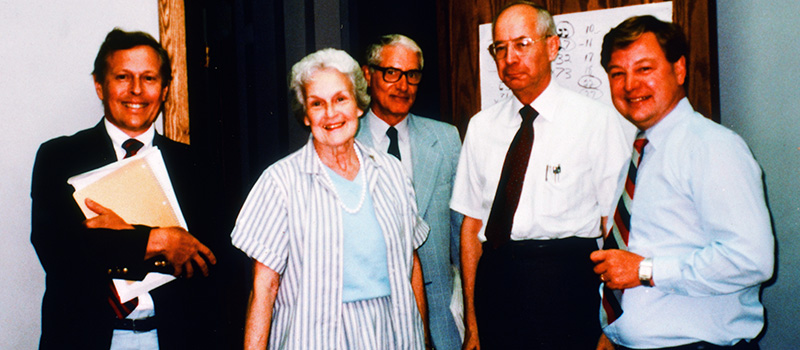 Moyer, left, poses for a photo with meeting attendees at the Iowa Peace Institute in 1988.
Moyer, left, poses for a photo with meeting attendees at the Iowa Peace Institute in 1988.
Sherman P. Willis ’01, a political science major and Africana studies concentrator, served on the Rosenfield Program Committee headed by Moyer. He still displays a photo of himself meeting former Senator George Mitchell in Grinnell House, and fondly recalls meeting the late South Sudanese leader John Garang ’69 on campus. “Those experiences as part of the Rosenfield Program have served me well,” Willis says, “and provided a great foundation for my interest in traveling the world and interacting with many cultures and situations.”
Other students have been inspired to go into government service or politics – and have brought their Moyer-assigned textbooks with them.
“Much against my spouse’s desires, I still have John Gaddis’ The United States and the Origins of the Cold War (1941-47) on a bookshelf at home, and both Daniel Yergin’s Shattered Peace: The Origins of the Cold War and Graham Allison’s Essence of Decision: Explaining the Cuban Missile Crisis, on a shelf in my Pentagon office,” says Pete Biesada ’84, director for planning and resourcing with the Office of the Secretary of the Navy. “All three books, plus others from Professor Moyer’s Political Science 250 (Politics of International Relations) syllabus, have margin notes written by me. The act of re-reading and adding more thoughts and subsequent cognitive connections are products of having a vista opened for us by a great teacher.”
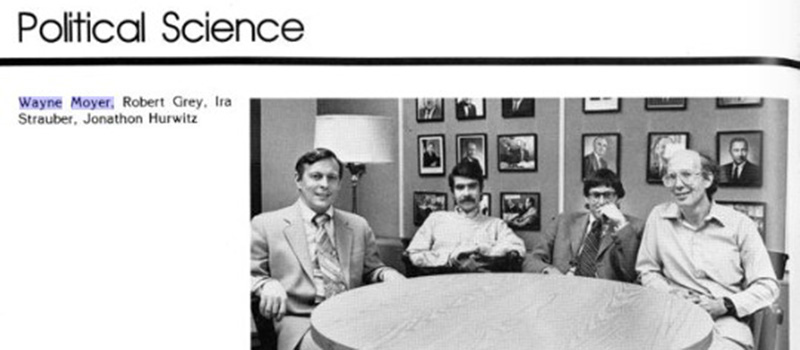 The 1983 political science faculty take a group photo for the yearbook.
The 1983 political science faculty take a group photo for the yearbook.
Goldfien was “totally hooked” on international relations after taking Moyer’s International Relations course. He subsequently took a seminar on U.S. foreign policy, and Moyer supervised his international relations thesis. After earning several advanced degrees, “I now teach foreign policy and international relations as a professor at the U.S. Naval War College, where I cover many of the same topics I first encountered at Grinnell with professor Moyer. Several of the heavily annotated books that I read for his courses sit on the bookshelf in my office.”
He made the history of U.S. foreign policy engaging,” Goldfien added. “I vividly remember walking back to my dorm after a discussion of the Cuban Missile Crisis thinking, ‘This is so cool.’”
Teaching great kids for 52 years
Over his five-plus decades of Grinnell, Moyer says he doesn’t think students have changed in a fundamental way. “They’re on social media now and issues change from era to era, but the fundamental values are what they’ve always been. Grinnell students have always been great kids, and I still think that’s the case.”
Sara Booher ’25 says she was lucky to be placed in Moyer’s tutorial class, Coping with Climate Change: How Science, Ethics, and Politics Interact, and was then inspired to major in political science and take other Moyer-taught classes on international relations.
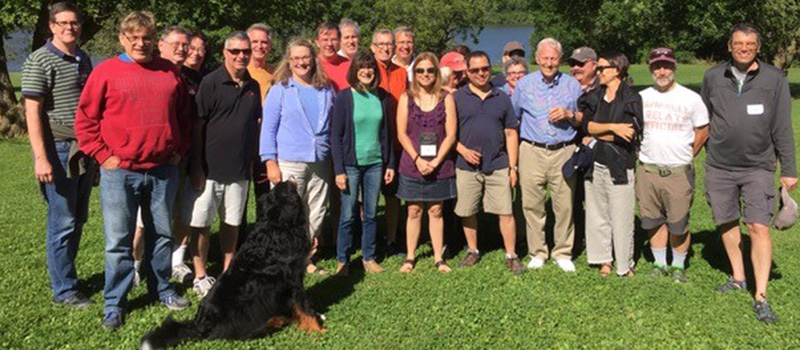 A group of alums from the mid-1970s through 1980s gathered in 2016 to play croquet with Wayne in the backyard of the Moyer residence.
A group of alums from the mid-1970s through 1980s gathered in 2016 to play croquet with Wayne in the backyard of the Moyer residence.
“One part of Professor Moyer’s classes that I always look forward to is the debates,” she says. “Having a chance to examine real-world issues in international affairs, develop claims, and defend them with evidence is a practice I relish as I come to understand some of the most pressing global issues. Professor Moyer is undoubtedly a legend on Grinnell’s campus, and I feel very fortunate to have learned from him.”
He’s also been a tremendous source of encouragement and support beyond the classroom. Booher is a center on Grinnell’s women’s basketball team, “and Professor Moyer would always ask how last night’s game went – or be in the stands cheering us on at home games. He has encouraged me to seek out different internship, fellowship, and graduate school opportunities, and he has been generous in providing support and advice throughout these processes.”
For Moyer, the relationships with students will continue, no matter his faculty status. “I want to keep engaged as much as I can,” Moyer says, whether it’s with current students, topics in international relations and climate change, and of course, alumni. “Direct email is probably the best way to keep in touch,” he says. “I love to hear from former students and hopefully I’ll be good at responding back.”
— by Anne Stein ’84